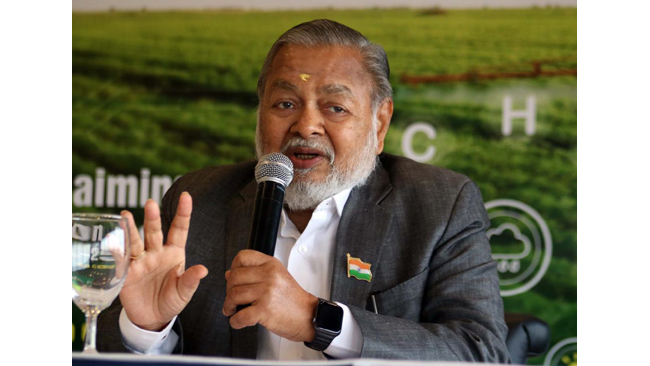
New Delhi, May 2023.
Dhanuka
Group Chairman Mr. R G Agarwal today made a strong pitch for the integration of
technological advancements, such as drones and artificial intelligence, with
the agriculture sector to enhance crop yield, reduce costs, and ultimately
improve the income of farmers.
The Dhanuka
Group is a prominent player in the agrochemical industry, with a mission to
empower farmers by providing them with innovative solutions.
Addressing
a press conference here, Mr. Agarwal said drones and artificial intelligence
are two of the most promising technologies that can revolutionize the
agriculture industry.
Drones have
already been used in the agriculture sector for spraying pesticides and other
activities, but they can be promoted on a larger scale through public-private
partnerships. We are also supplying the first drones approved by DGCA for use
in agriculture as well as spray services, he said.
He said the
implementation of advanced technologies like drones and artificial intelligence
will enable farmers to compete more effectively in the global market while
improving the efficiency of their farming operations.
“These
technologies can help in identifying crop diseases and pests attack in advance,
as well as assist in the efficient use of fertilizers and water management.
With the help of these technologies, farmers can make informed decisions based on
real-time data and plan their crops better,” said Mr. Agarwal.
He further
said Dhanuka Group is playing a significant role in the promotion of technology
and has also invested in a drone manufacturing company. The company is also
running several campaigns to increase awareness about the use of the right
quality farm inputs and purchase against bill only. He said recently, Dhanuka
Agritech has operationalised state-of-art Research & Training Centre (DART)
for farmers at Palwal (Haryana) which was inaugurated by Haryana Chief
Minister, Shri Manohar Lal Khattar.
Recognizing
the importance of technology accessibility, Mr. Agarwal stressed the need for a
"right to technology" for farmers, ensuring that they have affordable
access to modern tools and techniques.
“This
inclusion will enable farmers to leverage modern tools and techniques
effectively, addressing the challenges posed by climate change. It will enable
farmers to make the most of innovative solutions and effectively manage their
agricultural operations,” he said.
“The
adoption of modern technologies, along with the use of the right quality farm
inputs can help farmers address the challenges posed by pest attacks. Drones
and artificial intelligence can provide farmers with real-time information
about weather patterns, soil moisture levels, and other critical factors that
affect crop growth. With this information, farmers can make informed
decisions,” he said.
Dhanuka
Group Chairman also emphasised on the significance of providing farmers with
high-quality inputs, including seeds, fertilizers, and pesticides, at
reasonable rates.
The sale of
substandard/ spurious/ smuggled/ duplicate pesticides in the Indian agriculture
sector has had a detrimental impact on crop yields and farmers' income. Subpar
products fail to effectively control insects and pests, resulting in
significant crop losses.
To address
this issue, Mr Agarwal urged farmers to demand proper bills or receipts when
purchasing pesticides, ensuring transparency and accountability in the supply
chain.
The
industry veteran also urged both the central and state governments to take
stringent action against entities involved in the sale of substandard spurious/
smuggled/ duplicate agrochemicals and agri-inputs. Additionally, a
national-level awareness campaign is proposed to educate farmers about the
harmful effects of such products and promote the use of reliable, high-quality
agrochemicals.
Mr Agarwal
emphasized the need to improve the marketing infrastructure for agricultural
produce items, strengthening the supply chain and ensuring efficient
distribution channels to benefit farmers and consumers alike.
We are not
only self sufficient in our food requirements but are exporting also. Our per
hectare yield is much lower than other developed countries. Even if we compare
with China as per following chart, we are much behind and have to cover a long
way, which will be possible only by taking new technologies to the farmer and
adjust the GST of 18% on the purchase of agri-inputs.